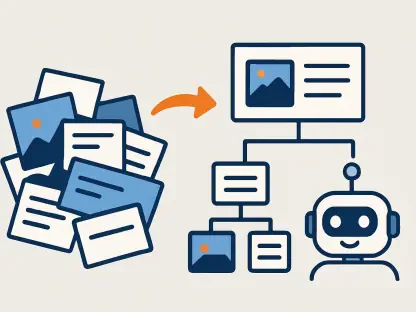In the relentless advance of technology, AI has emerged as a cornerstone of modern computing, reshaping the landscape in ways that seemed implausible a mere decade ago. A salient figure in this unfolding narrative is Microsoft, a behemoth in the software industry, yet one that faces a fundamental challenge in the realm of mobile computing and AI, as highlighted by Jez Corden of Windows Central. His pointed critique of Microsoft’s strategic retreat from the mobile hardware market raises an alarm about the company’s current and future positioning. Central to this analysis is the contention that Microsoft’s abandonment of its Windows Phone platform has not only created a gap in its product lineup but also potentially compromised its ability to capitalize on the AI revolution, a pivotal frontier for the next generation of human-computer interaction.
Microsoft’s Partnership Strategy in AI
The Reliance on External AI Innovations
Corden’s examination starts with Microsoft’s substantial investment in AI, notably betting on alliances like those with OpenAI and NVIDIA as opposed to nurturing innovation from within its ranks. While collaboration can drive the technology forward, it can also introduce points of weakness. By relying on these partnerships, Microsoft has, in some ways, outsourced the core of its AI endeavors, potentially at the expense of securing a proprietary, in-house stronghold in AI innovation. The critique suggests a need for introspection within Microsoft’s walls—to consider balancing these alliances with a resurgence of in-house development that could foster more control and uniqueness in its AI offerings.
Concerns Over OpenAI’s Expanding Relationships
The interplay between Microsoft and OpenAI, a narrative further complicated by the latter’s increasing rapport with Apple, marks a pivotal concern. There’s an underlying tension as Microsoft contemplates the impingement on their AI investment and market share lead occasioned by OpenAI’s cozying up with a key industry rival. Corden paints a picture of worry—Microsoft envisioned a partner in OpenAI that would help them stake a larger claim in AI, but instead, they are left spectating as OpenAI’s advancements, which once seemed to favor Microsoft, potentially become a boon to Apple. The “IT department” remark underscores the dichotomy in the perceived progression of the two entities; where Microsoft was once a shepherd, it may now risk becoming the flock.
The Impact of Abandoning Windows Phone
Mobile Market Absence and Its Repercussions
When Microsoft bowed out of the mobile hardware theater with the phasing out of Windows Phone, it left behind more than just a product—it ceded strategic ground in a vital industry sector. In a landscape dominated by mobile computing, Microsoft’s withdrawal has been nothing short of self-sabotage. Absent a mobile platform, Microsoft is forced to play by the rules of Google’s and Apple’s ecosystems—worlds where Windows finds itself tolerated rather than celebrated, encompassed by constraints that limit its market potential and presence. This, argues Corden, has considerable and enduring implications for Microsoft, repercussions that could keep echoing as mobile devices continue to reign supreme.
Missing Endpoint for AI Delivery to Consumers
The pivot toward AI-augmented services in mobile computing further magnifies the misstep of relinquishing the Windows Phone. Microsoft’s absence in the mobile hardware arena means missing a direct channel to end-users for their AI services, an omission that hampers the firm’s ability to influence and steer the consumer AI landscape. In contrast, Apple and Google push onward with native AI services deeply integrated into their mobile platforms, as seen with Apple’s partnership with OpenAI and Google’s Gemini project. Microsoft’s exclusion from this space not only narrows its market influence but threatens to relegate its AI efforts to the wings of the main stage, whereby they face the peril of becoming accessory over principal in the consumer AI narrative.
Reassessing the Mobile Strategy with AI at the Forefront
Possibilities of AI-Integrated Devices
To realign itself with the shifting paradigms, Corden suggests a route that could traverse beyond the beaten path—the creation of AI-centric devices by Microsoft. He speculates on the next Xbox iteration being endowed with an AI processor, perhaps sourced from AMD, a development that could bandage Microsoft’s consumer AI wounds. While not traditionally mobile, such a device could redefine the contours of AI in consumer electronics, offering a unique value proposition that challenges the smartphone hegemony and reaffirms Microsoft’s ambition and capability in the consumer AI space.
The Potential of Windows on Arm with AI
Corden scrutinizes Microsoft, highlighting its hefty investments in AI through strategic partnerships mainly with trailblazers like OpenAI and NVIDIA, rather than burgeoning innovation internally. While these collaborations have the potential to propel AI technology, they also carry inherent vulnerabilities. Microsoft’s strategy to lean heavily on partnerships may inadvertently sacrifice the development of a robust, in-house AI platform. This approach puts them at risk of not having exclusive control over their AI innovations. Critics point out that Microsoft might need to reevaluate its strategy to attain a balance between external alliances and cultivating its own AI solutions. By ramping up their in-house AI research and development, Microsoft could achieve a distinctive edge in the AI space, as well as ensure a more proprietary command over their technological advancements. This strategy could not only protect but also strengthen their position in the rapidly evolving AI industry.









